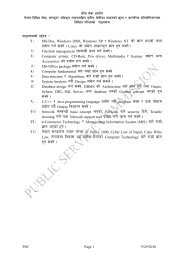You also want an ePaper? Increase the reach of your titles
YUMPU automatically turns print PDFs into web optimized ePapers that Google loves.
3.2 Public policy and service innovation<br />
At present, public policy makers have started to emphasize the potential for promoting<br />
service innovations as a part of their economic development strategies. It has been<br />
driven by the growing contribution of services, programs and activities which make<br />
particular country's economics. Various studies have shown that their traditional<br />
policy measures are not proved appropriate, technology transfer supports have<br />
been desirable and have been developed from a manufacturing perspective of the<br />
innovation process. Such corrective measures in public policies have been seriously<br />
taken in the European Commission Expert Group's Report on the field of service<br />
innovation, titled as "Fostering Innovation in Services" as well as various trendchart<br />
studies. This emerging thought in policy action has been translated to launch a<br />
number of knowledge intensive service platforms designed to act as laboratories for<br />
new public policies to design services innovation. This effort has been an integral<br />
part of Finland, Germany, Canada, Norway including other refracted societies of<br />
the globe. The allocation of new innovation of service delivery in the process of<br />
designing public policy has been appropriate and highly essential, especially in<br />
developing world.<br />
3.3 Proper identification of people's demand<br />
Due to the dissatisfaction of the people about the quality and process of the public<br />
service, innovation-based reform has been highly inevitable both in the developed<br />
and developing nations. Growing disbelief and distrust against government,<br />
people in developing countries, especially the ordinary people have been alienated<br />
from governments. Such situation has led to weaken achievements of democratic<br />
government. In many societies mass demonstration for transparency, accountability<br />
and demand-based planning has existed. This raises the loss of trust and institutional<br />
instability from the society. Such deplorable condition need to be improved by<br />
respecting the rule of law, human rights and proper identification of the ordinary<br />
people. Majority segment of the world population agrees with democratic principles<br />
that the will of the people should be the basis for the authority of government.<br />
But in many parts failure of innovation in public service delivery has been main<br />
cause of democratic failure. To address the heightened expectation of ordinary<br />
people governments need try to raise the basic services resulting mismatch to realize<br />
capacity building required to deliver. So every society has a need to regain its own<br />
ethnographic people to design their own system to deliver in the best possible<br />
manner. To obtain the ownership from the people, governments should understand<br />
what actually they need otherwise governments will run without the trust and<br />
confidence of ordinary citizens which is entirely futile and counterproductive for<br />
the concerned government.<br />
226



![Plss[tk/LIff k|0ffnL cGtu{t gf=;'= jf ;f];/x -ck|fljlws_ b/vf:t :jLs[lt Pj+ btf{ubf ...](https://img.yumpu.com/45492178/1/190x245/plsstk-liff-k-0ffnl-cgtut-gf-jf-f-x-ck-fljlws-b-vft-jlslt-pj-btfubf-.jpg?quality=85)
![sf7df8f}+pkTosf b/vf:t ;+s ng s]Gb|](https://img.yumpu.com/44258091/1/190x135/sf7df8f-pktosf-b-vft-s-ng-sgb-.jpg?quality=85)
![cfof]u sf]a}; ÃLcf}Fjflif{s f]T;a ;DkGg](https://img.yumpu.com/37043430/1/190x245/cfofu-sfa-alcffjflifs-fta-dkgg.jpg?quality=85)


![g]kfn k|zf;g ;]jf, g]kfn n]vfk/LIf0f ;]jf, g]kfn Gofo ;]jf, g]kfn k//fi6« ;]jf / g]kfn ...](https://img.yumpu.com/37041087/1/190x245/gkfn-k-zfg-jf-gkfn-nvfk-lif0f-jf-gkfn-gofo-jf-gkfn-k-fi6a-jf-gkfn-.jpg?quality=85)
![g]kfndf u](https://img.yumpu.com/37040612/1/190x253/gkfndf-u.jpg?quality=85)

![nf]s ;]jf cfof]u](https://img.yumpu.com/37040528/1/190x245/nfs-jf-cfofu.jpg?quality=85)


![nf]s ;]jf cfof]ug]k fn Ol~hlgol/Ë ;]jf, d]6 «f]nf]h L](https://img.yumpu.com/11277666/1/184x260/nfs-jf-cfofugk-fn-olhlgol-e-jf-d6-fnfh-l.jpg?quality=85)
![nf]s ;]jf cfof]u ck|fljlws tkm{s f k|z f;g ;]jf -;fdfGo k|z f;g, n]v f / /fh:j ;d](https://img.yumpu.com/8549291/1/184x260/nfs-jf-cfofu-ck-fljlws-tkms-f-k-z-fg-jf-fdfgo-k-z-fg-nv-f-fhj-dx-.jpg?quality=85)
